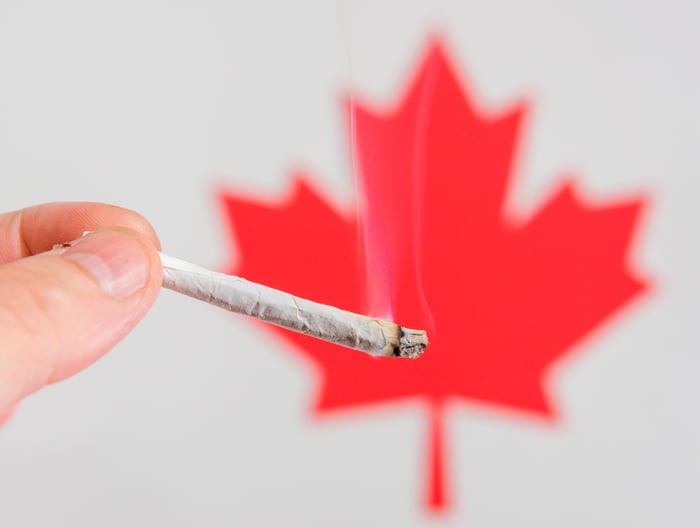The marijuana industry is growing like a proverbial weed, and marijuana stock investors have certainly taken notice. According to cannabis research firm ArcView, North American legal pot sales totaled $6.9 billion last year alone. However, by 2021, they could be pushing to north of $22 billion. Considering that more than $46 billion in weed sales was conducted under the table in 2016, there's a multiyear, and perhaps even multidecade, opportunity for legal marijuana businesses to convert consumers from black market channels to legal customers.
The recent legalization of medical cannabis in Mexico, along with ongoing state-level approvals in the U.S., are expected to be a boon to the industry. But it's the near-term promise of our neighbors to the north that could offer the biggest catalyst.

Image source: Getty Images.
Will Canada's maple leaf turn green for marijuana?
Recently, Prime Minister Justin Trudeau of Canada introduced legislation that would legalize recreational marijuana throughout the country by as soon as July 1, 2018. Trudeau's bill would allow for adults ages 21 and up to legally purchase marijuana, and it would let households grow up to four cannabis plants.
Per the Canadian government, approving recreational marijuana would add up to $5 billion to $7 billion in annual revenue, which is why the Canadian quartet of large growers -- Canopy Growth Corp. (CGC 1.28%), Aphria (NASDAQOTH: APHQF), Aurora Cannabis (ACB -1.15%), and MedReleaf (NASDAQOTH: MEDFF)(LEAF) -- are in the midst of rapidly boosting their grow capacity.
Canopy Growth has been expanding inorganically, having recently acquired Mettrum Health and 472,000 square feet of land surrounding its headquarters. The acquisition of Mettrum gave Canopy Growth access to roughly half of Canada's medical marijuana patients (which have been growing by about 10% a month according to Health Canada).
Meanwhile, Aphria, Aurora Cannabis, and MedReleaf are looking at organic growth to boost production. Aphria's $100 million capital project, known as Phase IV, should yield 75,000 kilograms of cannabis annually, while Aurora Cannabis claims that its 800,000 square foot facility known as Aurora Sky will be state-of-the-art in terms of automation. Finally, MedReleaf, which recently went public in the largest North American marijuana stock IPO of all time, is planning to use some of its proceeds to increase its grow capacity fourfold at its Bradford, Ontario, facility.

Image source: Getty Images.
Canada's recreational marijuana bill has two traditional problems
However, Canada's recreational marijuana bill isn't a guarantee to be implemented into law, even though Trudeau has personally backed such a measure, and public opinion toward cannabis has greatly improved over the years. Conservative members of Canada's parliament could provide quite the roadblock.
For starters, conservatives are worried about the home-grow provision built into Canada's recreational weed bill. It would only seem logical that legalizing pot would allow households to grow cannabis on their own. Conservative lawmakers, however, argue that it would give minors easy access to pot. Removing the home-grow option is one solution, but it probably wouldn't sit well with bill proponents.
Another issue with legalizing recreational weed is that there are no clear guidelines on what defines driver impairment. With alcohol, there are clear guidelines on what blood-alcohol level is acceptable and what is not. Because the psychoactive component of cannabis, tetrahydrocannabinol (THC), lingers for days or weeks in a person's system, it makes an accurate measure of impairment difficult to assess. Without these baseline figures, deciphering if a driver is under the influence could be difficult to enforce.
Canada has a really odd marijuana problem
These two traditional recreational legalization problems may be enough to stall the bill in parliament. But there's another issue with recreational legalization efforts in Canada -- a really, really odd issue.
According to a recent Bloomberg report, some members of Canada's parliament want to delay the implementation of the country's recreational weed bill (assuming it passes and is signed into law) because the country (drum roll)... won't have enough marijuana supply to meet demand. You heard that right. Producers simply won't have enough cannabis in their vaults to meet the expected surge in demand from the Canadian public.

Image source: Getty Images.
What would happen if Canada opened the floodgates on July 1, 2018, and there was a supply shortage for weed? The first likely response would be an increase in the price per ounce of marijuana. High demand and constrained supply is a telltale path to higher prices. If consumers are willing to pay those higher prices, then everything would be dandy, but if the price of legal marijuana grows to be notably higher than black market pot prices, then there's a big problem. In other words, it may push some consumers toward the black market that Trudeau so desperately wants to stamp out.
The other issue is that a cannabis shortage provides the perfect opportunity for the black market to step in and illegally fill the gap. Trudeau has already proposed low taxes to keep pricing comparable between legal and black market weed, but if there's not enough supply, there's little that can be done.
Even with the four Canadian producers listed above expanding their grow capacity considerably, it'd be a stretch to assume that all four will be up and running at full steam by July 2018.
Here's the not-so-secret reason why Canada has this odd marijuana issue
Recently, Health Canada announced a number of changes to its medical marijuana program. With just 44 licenses issued, the regulatory agency that's in charge of overseeing the welfare of its country's citizens announced that it would approve more grow licenses and allow pot producers to essentially fill up their vaults as long as it could be done safely and securely.
On the surface, this move by Health Canada seems to be a reaction to the idea that recreational marijuana could soon be approved. But dig a bit deeper and you'll find there's more to it than that.

Image source: Getty Images.
The real reason we could witness a marijuana shortage if Canada's recreational weed bill passes is because a handful of Canadian medical cannabis producers have been exporting their product overseas. There are more than two dozen countries in the world with legal medical cannabis programs, but only Canada and the Netherlands have producers that are legally allowed to export their product to these countries. There are four Canadian producers that are currently exporting, including Canopy Growth, Aphria, Cronos Group, and Tilray.
Germany provides the perfect example. Medical marijuana became officially legal in the country in March 2017, and the country actually provides health coverage for medical marijuana. Unfortunately, there are very few legal medical cannabis producers, meaning Germany is reliant on imports to meet the demands of patients. In November 2016, Canopy Growth Corp. acquired MedCann GmbH, a German-based pharmaceuticals distributor that allowed it access to Germany's medical pot market. This export relationship with Germany has been vital to Canopy Growth's expansion, but it comes at the cost of domestic production. As long as Canada is shipping cannabis overseas, its domestic market could face a shortage without a rapid increase in the number of licensed producers.
Here's the issue for Canadian growers like Canopy Growth and Aphria: They have a clear-cut competitive advantage in being among the first to legally export cannabis to foreign markets. However, if Health Canada boosts production capacity in Canada, a surge in supply could hammer domestic prices and margins. So, should growers focus on domestic markets and hope for the recreational pot bill to pass or keep their attention on expanding their overseas reach? It's a tough question with no clear answer, which is exactly where we stand right now with Canada's recreational pot bill.





